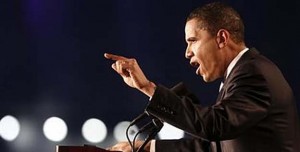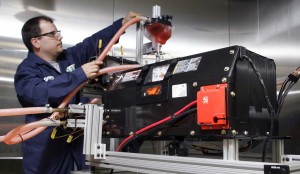
Power to the People? President Barack Obama will visit Michigan to press for more battery production.
President Obama will be charging through Michigan Thursday, stopping in Holland to mark the groundbreaking of the new LG Chem battery plant that will begin supplying lithium-ion packs to the nation’s two largest domestic automakers in 2012.
The Korean-owned plant, scheduled to be one of the first in this country to produce the basic lithium-ion cells for battery vehicles like the 2011 Chevrolet Volt will also produce batteries for Ford’s upcoming Focus Electric model, that automaker announced Tuesday.
Obama’s visit will be more than the classic political meet-and-greet session. The president will use his visit to the site of the LG Chem plant to focus on his administration’s efforts to expand the production and sales of plug-in hybrids, pure battery-electric vehicles (BEVs) and other battery-based cars, trucks and crossover.
For his part, the president is calling for the auto industry to be selling 1 million plug-ins, extended-range electric vehicles (the proper description of the Volt) and battery-electric vehicles by 2015.
While skeptics warn the technology is likely to remain expensive and limited in application for more than a decade to come, proponents insist that costs will come down –while consumer demand should rise — as manufacturers ramp up production of both batteries and battery vehicles. Though LG Chem’s facility is still two years from production, as many as four high-volume lithium-ion factories are expected to be operating by year’s end, including one in Indianapolis supplying the Norwegian-based Think!, which plans to produce its 2-seat City minicar in Elkhart, Indiana.
A new report set for release by the Department of Energy (DoE), later this week, forecasts a dramatic dip in lithium-ion prices, which have been running at about $1,000 per kilowatt hour of stored energy. Sources at General Motors tell TheDetroitBureau.com that they expect to bring that figure down well below $800 per kWh by the time the LG Chem plant is in operation, while several sources at Nissan say the maker is targeting a number closer to $400 per kWh for the LIon technology that will be used in its Leaf battery car — though probably not at the time of the vehicle’s late 2010 launch.
The DoE has been handing out billions of dollars to promote the development of automotive battery technology, including more than $500 million to new automotive start-ups Tesla Motors and Fisker Automotive, along with money to help LG Chem and GM set up battery operations in both Western Michigan and the Detroit suburbs.
When the Korean maker first announced the plant the facility was expected to start up as a production base for the Volt’s LIon batteries. But Ford has announced that it will turn to LG Chem’s Compact Power subsidiary as the source for its upcoming Focus Electric model, one of five BEVs and plug-ins it is developing for the U.S. market.
Ties between the two companies date back over a decade. Compact Power CEO Prabhakar Patil was working as a Ford engineer when he was put in charge of developing the automaker’s first hybrid system – which made its debut in the 2005 Escape Hybrid, the world’s first gas-electric sport-utility vehicle.
Sponsoring a U.S. battery manufacturing base is critical, many experts believe, to avoid dependence upon foreign sources, such as China and Japan, currently the primary producers of lithium technology. More production capacity is what “the industry needs as it moves toward the electrification of vehicles that lessen our dependence on foreign oil,” said Compact Power’s Patil.
The president is expected to use the BP oil spill in the Gulf of Mexico as a focal point for his campaign to shift away from petroleum towards cleaner and more renewable resources, though there is a bitter debate in Congress over the precise language of his called-for energy policy.
While lawmakers may be debating the merits of alternative power, the auto industry increasingly has come to embrace battery power, even if senior executives warn of the pitfalls to the technology. But as Woon-Chul Yang, Hyundai’s president of R&D operations, in Seoul, recently told TheDetroitBureau.com, the tough new 2016 fuel economy standards – and the likelihood of even tougher rules to follow – mean that, “We’ll probably have to have even more innovative (with the development of both conventional and advanced plug-in) hybrids and maybe even fuel-cell vehicles.”



Please. No more Obama! This guy has NO idea what is going on!
It won’t create diddly squat for jobs to any degree. Now, to say the least, Grandholm and her Progressive agenda will go from green to rust initiative!